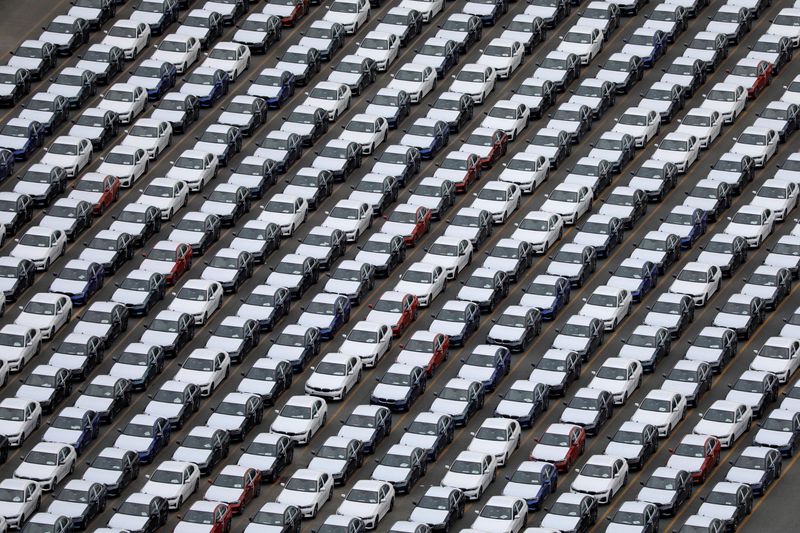By Ben Klayman, David Shepardson
DETROIT/WASHINGTON (Reuters) -European automakers are the most likely to be affected by the dockworkers strike at U.S. East Coast and Gulf Coast ports because they rely heavily on those locations, but a longer walkout could prove "debilitating" to the entire sector, industry officials and analysts said.
The dockworkers began their first large-scale stoppage in nearly 50 years early on Tuesday, halting the flow of about half the nation's ocean shipping.
The International Longshoremen's Association union representing 45,000 port workers had been negotiating with the United States Maritime Alliance (USMX) employer group for a new six-year contract.
A group representing major automakers urged the White House to broker a resolution.
"A protracted strike will be debilitating to the auto supply chain and set off economic and national security ripples across the country - harming auto communities and consumers," said John Bozzella, CEO of the Alliance for Automotive Innovation.
He noted that the ports affected by the strike handled 34% of all U.S. motor vehicle and parts trade worth $135.7 billion last year.
"If (the strike) turns into weeks, it's going to be a tragedy," said Steve Hughes, CEO of HCS International, which advises the auto sector on shipping issues.
While automakers could survive some time without vehicle deliveries, a shortage of parts would certainly hurt, Hughes said.
"If you look at a GM car, you're going to find all sorts of European and Asian parts in those cars now," he said.
The Motor & Equipment Manufacturers Association, a trade group for auto suppliers, also called on President Joe Biden to force both sides back to the bargaining table.
A shortage of parts could lead some automakers to reduce vehicle production, although analysts said some may quietly welcome that. Stellantis (NYSE:STLA), for example, has very high vehicle inventories.
Stellantis said it was taking steps to mitigate the potential impact of the strike on vehicle production without providing details.
Barclays analyst Dan Levy said 70% of auto parts imports into the U.S. come via the affected ports, although companies likely built up some inventory since the strike risk had been visible for a while. If automakers are forced to fly in parts, that could drive up costs.
"All of this is very, very inflationary," Hughes said.
European automakers, many of which use the ports on strike, would be the most affected, Levy said in a research note.
"The European (automakers) lean heavily on Baltimore for imports and Southeastern ports (i.e. Charleston) for exports, as most of their U.S. production exposure is in this region," he said.
BMW (ETR:BMWG) and Volkswagen (ETR:VOWG_p) said they were monitoring the situation closely and working to minimize any impact, while Volvo (OTC:VLVLY) Cars said it was devising contingency plans but had not yet experienced any noticeable impact. Officials with Mercedes could not immediately be reached to comment.
European imports have accounted for as much as half of the German automakers' U.S. sales in recent years and Volvo Car is even more reliant, Levy said. However, with inventories higher than usual, the companies may have prepared and the strike impact could be limited barring a long walkout, he said.
Truckmaker Volvo said the company stockpiled parts and looked into rerouting shipments to minimize impact and doesn't expect any impact in the short term.
Detroit automakers could actually benefit modestly as reduced industry inventories could limit pricing pressure, Levy said. The companies, including General Motors (NYSE:GM) and Ford (NYSE:F), are more likely affected by the import of parts since most of their vehicle imports come by truck and rail from Canada and Mexico, he said.
"We are carefully monitoring the situation and have contingency plans in place," GM said in a statement. "We will continue to work to mitigate any significant impact to our operations and will make adjustments as needed.”
The Detroit automaker declined to provide details on how it uses the ports or the nature of its contingency plans.
Ford said it was monitoring the situation, but said it was too early to speculate on potential impacts.
Asian automakers may be less affected, Levy said.
Toyota (NYSE:TM) built up extra vehicle inventory over the last couple of weeks to help buy it time and it was watching the talks closely, Toyota North America Executive Vice President Jack Hollis said in an interview.

Mazda said the ports of Baltimore and Jacksonville, Florida, were important for the Japanese automaker, but its vehicle inventories were sufficient to meet short-term demand. Honda (NYSE:HMC) said it was affected by the strike, without providing details, while Nissan (OTC:NSANY) said it has implemented contingency measures to mitigate delays, but declined to provide details.
Hyundai (OTC:HYMTF) said its logistics affiliate, Hyundai Glovis, was closely monitoring the talks and working on alternate plans to ensure delivery of vehicles.